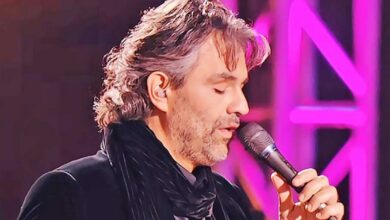Pain audible in his voice; two months later he passed, roaring like an old lion
Johnny Cash’s final live performance took place on July 5, 2003, at the Carter Family Fold in Hiltons, Virginia, marking a poignant chapter in the storied career of one of music’s most iconic figures. At the time, Cash was in frail health, battling severe vision loss and physical weakness, yet his commitment to his craft remained unwavering. Supported by a small band that included his son John Carter Cash, Jerry Hensley, and Bobby Starnes, Cash opened the concert with his trademark greeting, “Hello, I’m Johnny Cash,” a phrase that resonated deeply with his audience and symbolized his enduring presence in the annals of American music.
The setlist for the evening was a journey through Cash’s celebrated repertoire, featuring timeless classics like “Folsom Prison Blues,” “I Walk the Line,” “Ring of Fire,” and “Big River.” These songs, which had defined different eras of his career, took on new meaning amidst the backdrop of personal loss following the recent passing of his beloved wife, June Carter Cash. The emotional depth of the performance was particularly evident during his rendition of “Angel Band,” a song that had been sung by Emmylou Harris at June’s funeral. As Cash’s voice filled the venue, it carried not only the weight of his grief but also a profound sense of love and reverence for his late wife.
Another poignant moment came with “Understand Your Man,” a song Cash hadn’t performed in over two decades. Its inclusion added a layer of nostalgia and reflection, underscoring the journey of Cash’s life and the evolution of his music over the years. Throughout the concert, Cash spoke directly to the audience, sharing anecdotes and reflections that gave insight into his personal struggles and the enduring influence of June’s spirit on his life and music.
Beyond his musical contributions, Johnny Cash was a cultural icon whose impact transcended genres. His deep, resonant voice and rebellious spirit made him a voice for the marginalized and a beacon of authenticity in an industry often driven by trends. His songs were not just narratives but reflections of societal issues, from prison reform to the human condition, reflecting his own experiences and observations.
Cash’s career spanned multiple decades and genres, earning him a diverse and dedicated following that appreciated his ability to speak to universal truths through music. His influence extended far beyond the stage; he was a passionate advocate for social justice and humanitarian causes, using his platform to shine a light on issues close to his heart. His legacy as both an artist and an activist continues to resonate, inspiring generations of musicians and fans alike.
Johnny Cash’s final performance stands as a testament to his resilience, his unwavering dedication to his art, and his ability to connect with audiences on a deeply emotional level. Despite the challenges he faced in his final years, Cash’s voice remained a powerful instrument of expression, delivering a performance that was not just a farewell but a reaffirmation of his enduring legacy. As the final chords echoed through the Carter Family Fold that summer evening, Johnny Cash left behind a musical legacy that continues to shape the fabric of American music and cultural history.





